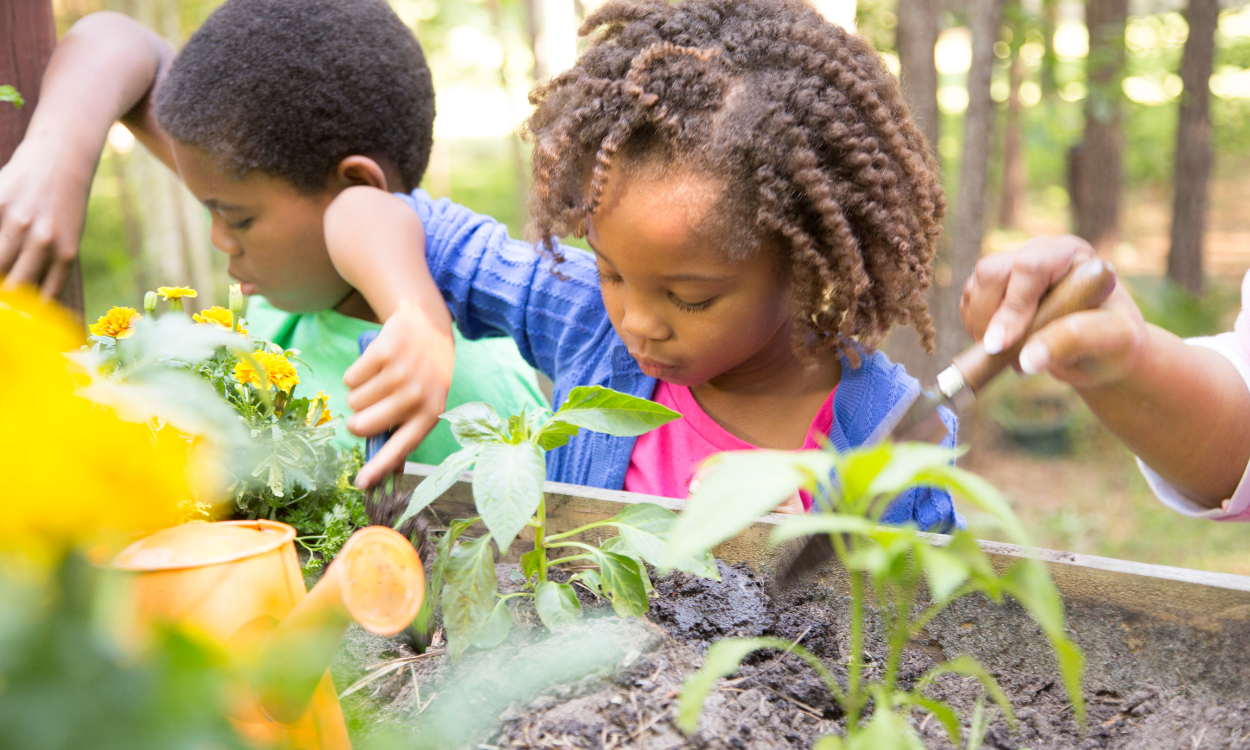Gardening is often seen as a pastime for adults, but it holds a special place in the world of Montessori education. Dr. Maria Montessori, the visionary behind the Montessori method, believed that the outdoor environment was an extension of the indoor classroom. She recognized that children’s interactions with nature were integral to their physical, cognitive, and mental development. This belief led to the integration of gardening activities into Montessori early education, and it has proven to be a valuable component of a child’s learning journey. Let’s discuss what the benefits of Montessori gardening activities for preschoolers are and how they assist in your child’s development.
Benefits of Montessori Gardening Activities for Preschoolers
Montessori gardening activities fall under the category of “care for the environment” in practical life activities. These activities often include basic gardening tasks such as watering, sowing, or weeding. Gardening offers preschoolers a unique opportunity to connect with the environment, nature, and other living organisms. It is not just about nurturing plants; it’s a holistic learning experience that promotes various aspects of a child’s development.
The Physical Benefits of Montessori Gardening
One of the primary benefits of Montessori gardening is its contribution to physical development. The act of gardening involves a range of motor skills, from gross motor skills to fine motor skills. When children carry gardening tools or water plants, they’re developing their gross motor skills. Meanwhile, tasks like weeding, leaf-cutting, and handling tools with a pincer grip aid in the development of fine motor skills. The garden becomes a natural playground for the development of essential physical development!
Cognitive Development in the Garden
Cognitive development is closely linked to a child’s intellectual growth, problem-solving abilities, and analytical thinking. Montessori gardening activities offer the perfect platform for cognitive development. By engaging in open-ended questions about plants and the best way to take care of them, the children are actively learning. They learn to think critically, make predictions, and analyze information. This approach empowers them to take an active role in their education and understand the world around them more deeply.
Enhancing Literacy Skills Through Gardening
Montessori gardening also contributes to the development of literacy skills. Children learn the names of various plants, seeds, and gardening equipment, thus expanding their vocabulary. Keeping track of the plants they’ve sown through a garden map enhances their ability to record and categorize information. These literacy skills are foundational for a child’s overall education both in and out of the garden.
The Multifaceted Benefits of Montessori Gardening
Gardening is more than just nurturing plants; it cultivates essential values and skills in children. Here are eight key benefits of Montessori gardening:
Sensory Stimulation: Gardening provides an explosion of sensory experiences. Children touch different textures, smell aromatic plants, taste homegrown fruits and vegetables, appreciate vibrant colors, and listen to the soothing sounds of nature.
Healthy Eating Habits: Growing your own fruits and vegetables encourages healthy eating habits in children. Children are more likely to try foods they’ve grown themselves, making them open to a wider variety of nutritious choices.
Fine Motor Skill Development: As discussed above, tasks like watering, sowing, sorting, digging, and weeding in the garden improve fine motor skills.
Discipline and Responsibility: Having their own garden space teaches children discipline and responsibility. They learn to care for something and understand the consequences of their actions.
Understanding Science: Gardening is a practical lesson in botany and chemistry. Children learn about the effects of sunlight, water, and weather on plant growth, as well as the role of different soils.
Math Skills: Gardening involves concepts of counting and measurements, teaching children about appropriate seed distances, row spacing, water amounts, and sunlight requirements.
Self-Confidence: Children experience a sense of accomplishment and build self-confidence as they care for and witness their plants’ growth.
Family Time: Gardening offers a unique opportunity for parents and children to bond, away from screens and distractions, creating meaningful family memories.
Inspire Kids Montessori: Nurturing Growth Through Gardening
At Inspire Kids Montessori, we are committed to following Dr. Maria Montessori’s teachings. Our Montessori-certified teachers provide a beautiful outdoor space where our students can explore, learn, and engage in gardening activities. We firmly believe in the power of the Montessori method and the importance of connecting children with nature. In our school, children maintain a communal garden plot, fostering collaboration, sharing, and a strong sense of community.
If you’re looking for a Chandler Montessori school or an Ahwatukee Montessori school that prioritizes your child’s growth and development, Inspire Kids Montessori is the place to be. Our garden is not just a place for plants to flourish; it’s a space where children can thrive and embrace the many benefits of Montessori gardening. Schedule a tour today and discover the IKM difference for your child. Let us help your child grow, learn, and connect with the natural world in a nurturing, inspiring environment.

